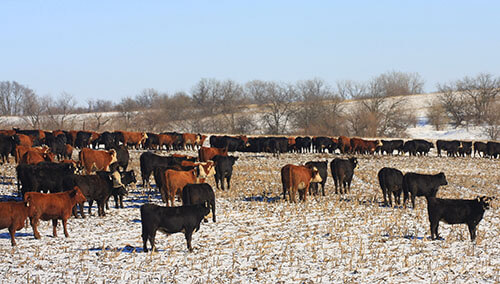Supplementing Cattle through Winter
Nov 23, 2020

As we supplement cattle throughout the winter season, producers should understand how nutritional needs are core to economical production. Nutrient requirements will vary as to whether your goal is for your cattle to maintain or gain weight. Everything starts with forage, both quantity and quality.
It is important to test and evaluate forage to understand and estimate the amount of nutrients needed to meet the animal’s requirement. Only then can you estimate what feed is needed to make up any shortfall. When forage quality is low, overall forage intake will also be low. Factors such as type of forage (grass, legume, etc.) and maturity (as forages grow and mature, forage digestibility declines) affect the quality.
On most operations, energy and protein are needed in the largest quantity. Data indicates increasing protein for maintaining cattle will aid the animals’ ability to consume and digest more forage. However, most forage offered diminishing responses to exclusive protein supplementation only. For the most part, only in times of extremely poor forage quality will protein only supplements elicit gains. Generally, additional energy and protein will be necessary, especially for lactating cows.
The most cost-effective supplements may not be based on protein concentration. There are many types of supplements available to producers based not only on nutrition but also on labor needs. Products that can be offered free-choice are a good option when it is difficult to feed animals daily. It’s critical to evaluate labels of all products, commodities, and ingredients in order to make the best purchasing decision. Look for recommended feeding rates. Some protein supplements may have both protein and energy but cattle may not be able to consume enough to matter.
Where forage is limited, the percentage of the diet made up of the supplement will be higher, so some self-regulating products that allow for only a half-pound per day intake may not provide enough nutrition.
It is necessary to plan for a desired level of performance throughout all stages of production. Forage is the vital portion when choosing supplementation to meet nutritional goals.
Your Co-op feed representative will be happy to assist you in evaluating the proper feeding strategies for all stages of production.
It is important to test and evaluate forage to understand and estimate the amount of nutrients needed to meet the animal’s requirement. Only then can you estimate what feed is needed to make up any shortfall. When forage quality is low, overall forage intake will also be low. Factors such as type of forage (grass, legume, etc.) and maturity (as forages grow and mature, forage digestibility declines) affect the quality.
On most operations, energy and protein are needed in the largest quantity. Data indicates increasing protein for maintaining cattle will aid the animals’ ability to consume and digest more forage. However, most forage offered diminishing responses to exclusive protein supplementation only. For the most part, only in times of extremely poor forage quality will protein only supplements elicit gains. Generally, additional energy and protein will be necessary, especially for lactating cows.
The most cost-effective supplements may not be based on protein concentration. There are many types of supplements available to producers based not only on nutrition but also on labor needs. Products that can be offered free-choice are a good option when it is difficult to feed animals daily. It’s critical to evaluate labels of all products, commodities, and ingredients in order to make the best purchasing decision. Look for recommended feeding rates. Some protein supplements may have both protein and energy but cattle may not be able to consume enough to matter.
Where forage is limited, the percentage of the diet made up of the supplement will be higher, so some self-regulating products that allow for only a half-pound per day intake may not provide enough nutrition.
It is necessary to plan for a desired level of performance throughout all stages of production. Forage is the vital portion when choosing supplementation to meet nutritional goals.
Your Co-op feed representative will be happy to assist you in evaluating the proper feeding strategies for all stages of production.